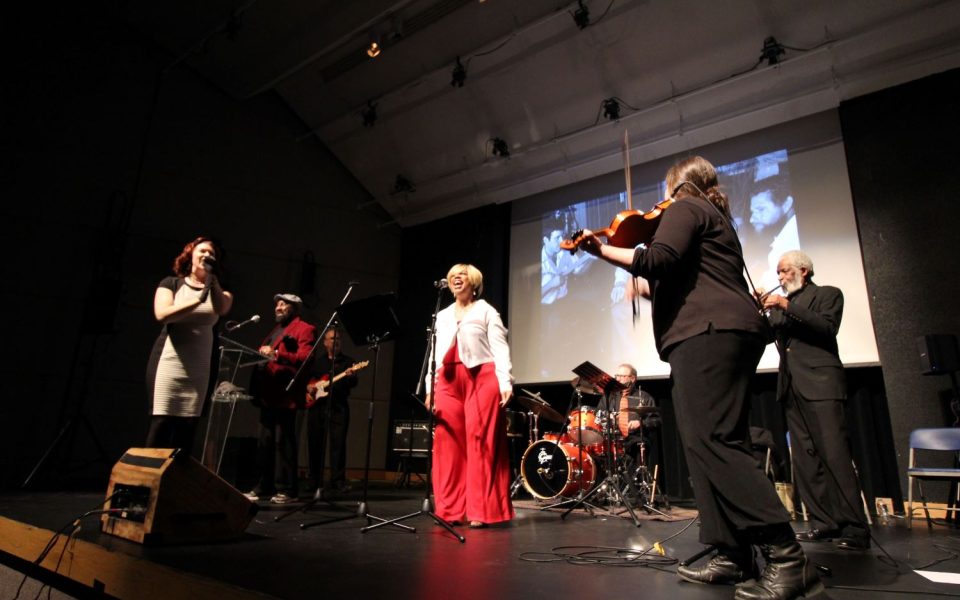“Well
now, take down your fishing pole,” Karon Click and Diana Tuffin sing, “and meet
me at the fishing hole.”
As
Tuffin and Click sing the Andy Griffith song “Fishing Hole,” the room becomes
electric with clapping and the occasional stomp to the beat. A few members of
the crowd sing along to the words they know, as the tune continues.
The
performance opens a special Friday-night version of Carolina Live, a multimedia
show from Carolina Music Ways. The set, filled with songs from North Carolina
artists, tells the story of the state’s musical history. Usually, the band
visits elementary and sometimes middle schools in Forsyth and the surrounding
counties. But, to fund-raise, the band found its way to the auditorium of the
Southeastern Center for Contemporary Art.
“Everybody
walks away learning something,” Music Director Matt Kendrick says.
Kendrick
works with a team of mostly volunteers, as they anthologize the music of North
Carolina’s past. Carolina Music Ways then writes a script for the show, and
Kendrick joins in to set the soundtrack, hand-selecting pieces from
internationally known musicians, with North Carolinian roots.
The
set continues with a brief history of old-time American folk music, before
settling on the music of Tommy Jarrell, an Appalachian singer with skill in
banjo and fiddle who hailed from the Mt. Airy region and rose to prominence in
the 1960s. The band turns its focus to banjo and fiddle Debbie Gitlin, who
takes a moment before the song to tell her own story of Jarrell.

“I came from Ohio just to meet this man,” Gitlin said. “Before then, I was a classical viola player.”
As
the singers lead a call-and-response in “Sail Away Ladies,” Gitlin stomps her
feet to the beat of her fiddling. Her arm moves the bow so quickly it looks
like a blur. Click takes her microphone from the stand and runs into the crowd,
holding it up to random audience members to sing the next lines.

Barbara
Long, a co-chair of Carolina Music Ways, sees that when they take the program
into schools, many kids will sing along. The participation helps immerse the
organization’s audiences, many of which are in Title I schools. Aside from the
performances, the group sends curriculum to the teachers prior to the concert.
Long describes it as a mix between social studies and music, teaching kids the
genres along with the time periods they became popular in. Long believes seeing
legends that come from North Carolina help kids to be confident that they could
also pursue successful artistic careers.
“I
just have never seen this level of talent, passion,” Long says, “and the way
students respond to it.”
Another
North Carolina legend that Carolina Live highlights is Nina Simone. Tuffin
approaches the mic and belts out “I Wish I Knew How It Would Feel to be Free,”
a song originally written by Billy Taylor, also a North Carolina resident.
Simone popularized the tune with her own 1967 rendition. The audience claps, as
the jazz rings out in the auditorium, Tuffin’s voice filling the space with the
power of the civil rights anthem.

“Well,
I wish I could be like a bird in the sky,” Tuffin sings. “How sweet it would
be, if I found I could fly.”
As
the night closes, Carolina Live pays tribute to Winston-Salem’s “5” Royales.
Attention is called to trumpet-player Joe Robinson, who reminiscences onstage
about being a close friend of the son of one of the members.
“I was a kid,” Robinson laughs. “I didn’t know they were famous; I just knew every time they’d come home, there was going to be a party.”
The
band begins to play “Dedicated to the One I Love,” guitarist Wiley Porter
stepping towards the front of the stage to show how Lowman Pauling would play.
He lowers his body slightly, the guitar dropping a little closer to his knees.
He extends the invitation to anyone who’d like to try, opening up an air guitar
competition.
An
elderly man steps onstage, as does a young woman. Then, two young children run
onstage, unsure where to go. The musicians usher the kids to the front.

As Porter continues to play on, the elementary-aged kids look up at him, trying to mimic his movements, like Porter tries to do with Pauling’s.
To learn more about Carolina Music Ways, and Carolina Live, visit carolinamusicways.org.
Join the First Amendment Society, a membership that goes directly to funding TCB‘s newsroom.
We believe that reporting can save the world.
The TCB First Amendment Society recognizes the vital role of a free, unfettered press with a bundling of local experiences designed to build community, and unique engagements with our newsroom that will help you understand, and shape, local journalism’s critical role in uplifting the people in our cities.
All revenue goes directly into the newsroom as reporters’ salaries and freelance commissions.


Leave a Reply